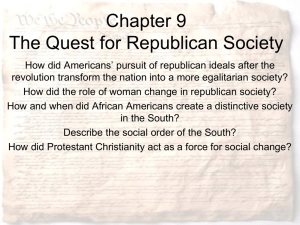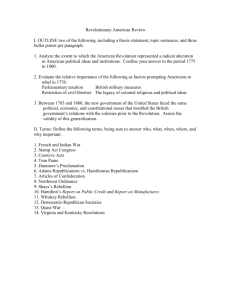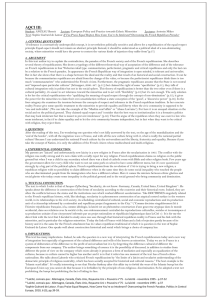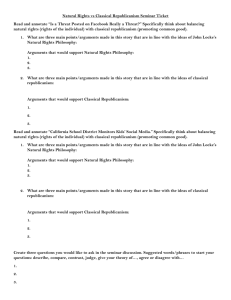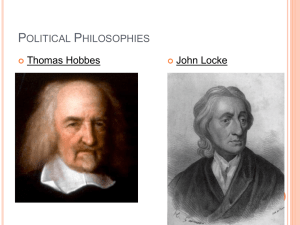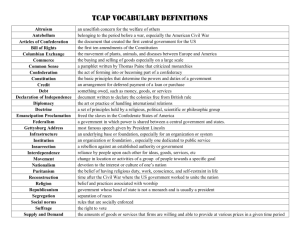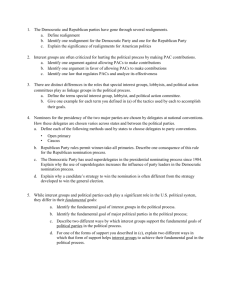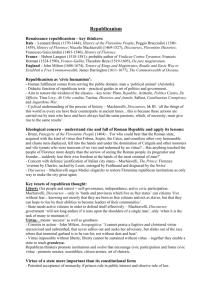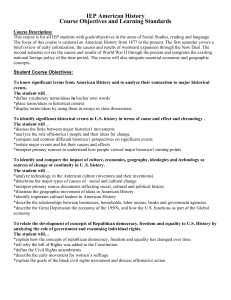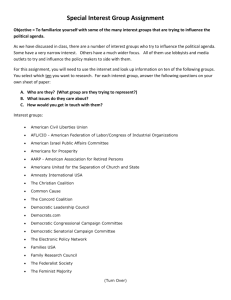The Quest for a Republican Society - Online
advertisement
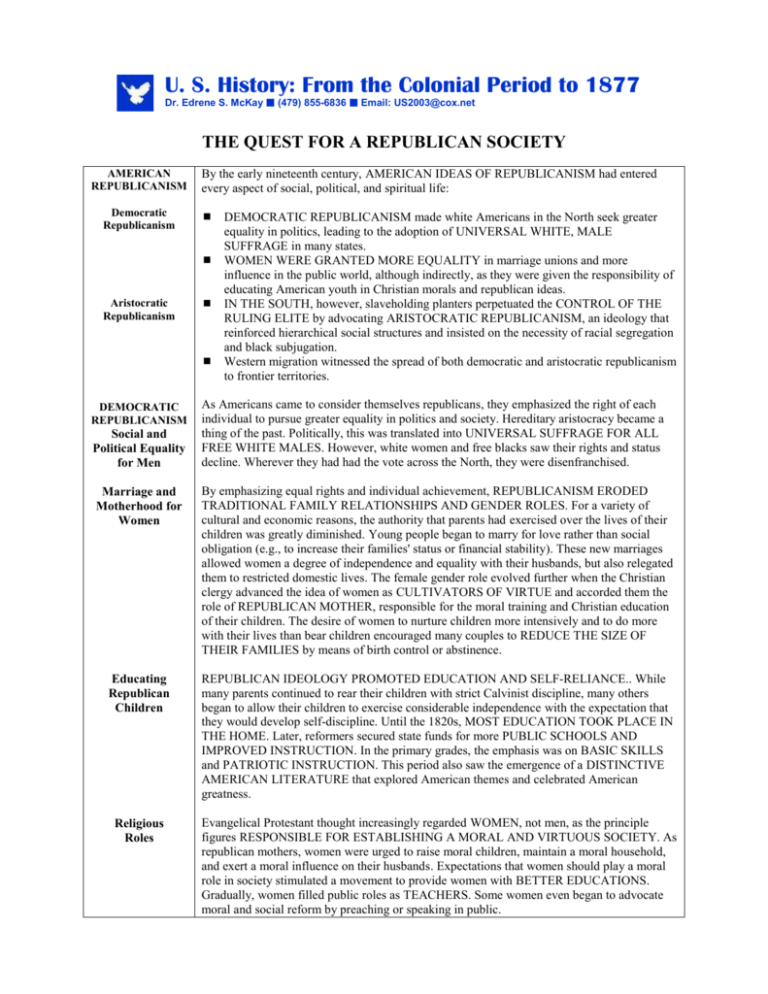
U. S. History: From the Colonial Period to 1877 Dr. Edrene S. McKay (479) 855-6836 Email: US2003@cox.net THE QUEST FOR A REPUBLICAN SOCIETY AMERICAN REPUBLICANISM Democratic Republicanism Aristocratic Republicanism DEMOCRATIC REPUBLICANISM Social and Political Equality for Men By the early nineteenth century, AMERICAN IDEAS OF REPUBLICANISM had entered every aspect of social, political, and spiritual life: DEMOCRATIC REPUBLICANISM made white Americans in the North seek greater equality in politics, leading to the adoption of UNIVERSAL WHITE, MALE SUFFRAGE in many states. WOMEN WERE GRANTED MORE EQUALITY in marriage unions and more influence in the public world, although indirectly, as they were given the responsibility of educating American youth in Christian morals and republican ideas. IN THE SOUTH, however, slaveholding planters perpetuated the CONTROL OF THE RULING ELITE by advocating ARISTOCRATIC REPUBLICANISM, an ideology that reinforced hierarchical social structures and insisted on the necessity of racial segregation and black subjugation. Western migration witnessed the spread of both democratic and aristocratic republicanism to frontier territories. As Americans came to consider themselves republicans, they emphasized the right of each individual to pursue greater equality in politics and society. Hereditary aristocracy became a thing of the past. Politically, this was translated into UNIVERSAL SUFFRAGE FOR ALL FREE WHITE MALES. However, white women and free blacks saw their rights and status decline. Wherever they had had the vote across the North, they were disenfranchised. Marriage and Motherhood for Women By emphasizing equal rights and individual achievement, REPUBLICANISM ERODED TRADITIONAL FAMILY RELATIONSHIPS AND GENDER ROLES. For a variety of cultural and economic reasons, the authority that parents had exercised over the lives of their children was greatly diminished. Young people began to marry for love rather than social obligation (e.g., to increase their families' status or financial stability). These new marriages allowed women a degree of independence and equality with their husbands, but also relegated them to restricted domestic lives. The female gender role evolved further when the Christian clergy advanced the idea of women as CULTIVATORS OF VIRTUE and accorded them the role of REPUBLICAN MOTHER, responsible for the moral training and Christian education of their children. The desire of women to nurture children more intensively and to do more with their lives than bear children encouraged many couples to REDUCE THE SIZE OF THEIR FAMILIES by means of birth control or abstinence. Educating Republican Children REPUBLICAN IDEOLOGY PROMOTED EDUCATION AND SELF-RELIANCE.. While many parents continued to rear their children with strict Calvinist discipline, many others began to allow their children to exercise considerable independence with the expectation that they would develop self-discipline. Until the 1820s, MOST EDUCATION TOOK PLACE IN THE HOME. Later, reformers secured state funds for more PUBLIC SCHOOLS AND IMPROVED INSTRUCTION. In the primary grades, the emphasis was on BASIC SKILLS and PATRIOTIC INSTRUCTION. This period also saw the emergence of a DISTINCTIVE AMERICAN LITERATURE that explored American themes and celebrated American greatness. Religious Roles Evangelical Protestant thought increasingly regarded WOMEN, not men, as the principle figures RESPONSIBLE FOR ESTABLISHING A MORAL AND VIRTUOUS SOCIETY. As republican mothers, women were urged to raise moral children, maintain a moral household, and exert a moral influence on their husbands. Expectations that women should play a moral role in society stimulated a movement to provide women with BETTER EDUCATIONS. Gradually, women filled public roles as TEACHERS. Some women even began to advocate moral and social reform by preaching or speaking in public. The Quest for a Republican Society In some smaller Baptist sects and in the Quaker church, women SERVED WITH MEN ON GOVERNANCE COMMITTEES. In some Methodist and Baptist congregations, women even SERVED AS PREACHERS OR EXHORTERS, although they were not ordained ministers. Jemima Wilkinson, the best-known female preacher, believed that she was neither male nor female, wore her hair in the masculine style, and did not use gender-specific pronouns. She established a settlement in western New York with more than 250 followers. As women exhorters became more common, they were subject to CRITICISM FROM ESTABLISHED CHURCH AUTHORITIES who believed that WOMEN SHOULD REMAIN SILENT. Consequently, in the majority of Protestant congregations, individual CHURCHES REINSTATED GENDERED PATTERNS OF DOMINANCE AND SUBORDINATION. ARISTOCRATIC REPUBLICANISM North and South Grow Apart The Southern Social Order Southern society, because of its COMMITMENT TO THE CONTINUATION OF A SLAVEBASED AGRICULTURAL ECONOMY, developed in a distinctly different way from the North. As the price of cotton increased and the old cotton regions on the coast declined in productivity, southern slaveholders uprooted whole communities, taking their slaves to the rich new lands of the Mississippi valley. The EXPANSION OF SLAVERY across the South INCREASED POLITICAL TENSIONS BETWEEN THE NORTH AND THE SOUTH. Although the North strongly advocated an end to slavery, politicians from the two regions were still able to compromise on national policies, placing the stability of the union ahead of concerns over regional differences. This task would become more difficult as the social and cultural differences between the north and the south sharpened. White society in the South became INCREASINGLY HIERARCHICAL, redefining southern republicanism in aristocratic terms. The shrinking minority of white southern SLAVEHOLDERS DOMINATED SOCIETY and viewed themselves as a NATURAL ARISTOCRACY – a group that was MEANT BY NATURE TO RULE. To assert this supremacy, they lived lavishly and justified their social power by claiming to uphold republican ideas of white equality and by performing philanthropic acts. In the new Republican age, slaveholders JUSTIFIED SLAVERY AS A NECESSARY EVIL, both FOR WHITE PROSPERITY AND TO PREVENT A RACE WAR. They maintained power over poor whites through RACIAL SOLIDARITY, even though they forced poor whites into tenancy, provided them few opportunities for advancement, and dominated politics. In such an OLIGARCHY, there was little chance for republican social and political equality to develop. Slave Society and Culture African American LIFE IN SLAVERY was made up of FAMILY-CENTERED COMMUNITIES tied to each other by the cultural traditions of their African past. The more stable the families and communities, the better they were able to resist and endure white oppression. Although slaves continued to suffer PHYSICAL ABUSES, the EMOTIONAL TURMOIL that accompanied the sale and separation of their families, and the SEXUAL ASSAULT OF WOMEN, they INCREASINGLY QUESTIONED AND RESISTED THESE ABUSES. Though a few slaves did revolt or escape, for most this was not possible, and they tried to make the best of their lives on the plantations. The Free Black Population Outside slavery, a growing COMMUNITY OF FREE BLACKS emerged in the urban North and South. Though free blacks were SEGREGATED AND DISCRIMINATED AGAINST, some of them did become CRAFT WORKERS or SHOPKEEPERS and established CHURCHES, SCHOOLS, associations, and social welfare programs. SYMBOLS OF FREEDOM to their enslaved brethren, free blacks were viewed as THREATS TO THE EXISTING SOCIAL ORDER by the majority of whites. Slavery Expansion The unfortunate SPREAD OF THE SOUTHERN SLAVE-BASED AGRICULTURAL SYSTEM to a number of new southern states led to conflict between northern and southern interests, a situation resolved for a time with the Missouri Compromise of 1820-1821. However, the PLIGHT OF AFRICAN AMERICAN SLAVES WOULD CONTINUE UNABATED, justified by southern planters as a "necessary evil." The Quest for a Republican Society A Thriving Black Culture Nonetheless, SLAVE COMMUNITIES DEVELOPED THRIVING CULTURES, drawing on their AFRICAN ANCESTRY and AMERICAN RELIGIOUS AND POLITICAL IDEAS. The free black population also thrived, despite its members' relegation to second class citizenry. DISCUSSION QUESTIONS What limitations on freedom do you observe in each of the forms of Republicanism (Democratic Republicanism and Aristocratic Republicanism)? Discuss the remarkable culture that African Americans were able to create despite their enslavement and/or second class citizenship.
